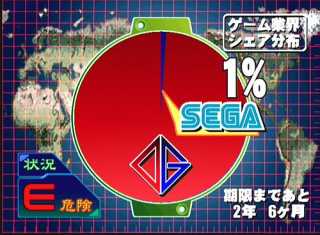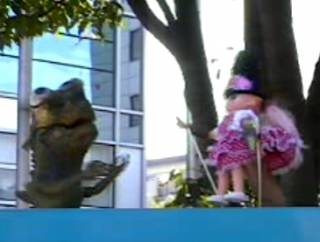Overview
SGGG (pronounced "Segagaga") is a video game developed by Hitmaker and released for the Dreamcast in March 2001, just two months after Sega themselves announced their support for the console would be discontinued. It was never released outside of Japan and thus no English language version currently exists, and while a fan translation project has been in progress for several years, it remains to be seen if it will ever be released. The game spans multiple genres, but ultimately it boils down to a "Sega simulator," essentially asking the player what they would do were they in charge of the company. Because of this, SGGG is knowingly self-referrential and contains an absolute abundance of in jokes and parody of various aspects of Sega as an organisation and the video game industry as a whole.
Story
The game is set in the year 2025, where Sega's market share has been annihilated by the evil Dogma Company (obviously based on a particular competitor to Sega) and fallen to a dismal 3% (at the time of the games release, Sega held just 2.6% of the Japanese hardware market). In an attempt to restore it's place in the video game industry, Sega initiated a top-secret program, the titular SGGG project. Two applications are sent out to a pair of teenagers, Tarou and Yayoi, where they are invited to Sega headquarters and put in charge of running the company. The player takes control of Tarou, who is tasked with assembling a development team and overseeing the development of game titles to help Sega defeat the Dogma Company.
Gameplay
 Keeping track of Sega's market share is the key to success.
Keeping track of Sega's market share is the key to success.At the beginning of the game, the player has access to one development studio, but can take control of three. In order to develop titles, the player must recruit the crazed denizen's of the laboratories below the complex. The recruitment process plays out like a typical JRPG, with the player buying equipment (energy drinks and magazines), moving over a 3D environment and dealing with random encounters. Upon defeating an enemy, the player can attempt to recruit the enemy into the development team, the enemy is more likely to join if offered a desirable salary (or if they are taunted or abused into joining). If the player loses a battle in the game, they lose 1 crucial month of development time. When the player has a decent team they can start developing games or even develop their own video game console, turning the game into more of a Simulator. There is a certain strategy involved, not only having to keep the team motivated, but also making sure the budget stays on track. The player must also pay special attention to market share, as development times of video games can vary, and the Dogma Company can release games of their own. If the marketshare reaches 0%, the skeptical Sega executives will deem the SGGG program a failure, resulting in Game Over. There are also several scattered mini-games, as well as a climactic full-blown 2D shooter. The latter got much attention over the years for climaxing in a final boss battle in which the player fights all of Sega's systems as if they were an enemy spacecraft.
Development
 Yep. This is a real thing.
Yep. This is a real thing.The development of SGGG followed a two-year development cycle. The game's overall director and de-facto producer Tez Okano, approached the Sega executives about making the title. His initial presentation was successful, but the company wasn't aware he was serious. After a second meeting, he managed to secure a budget for the title. The development of SGGG remained very secretive, as Okano did not want to arouse attention from people who could axe the development. When Okano came forth with the finished product, the company was mainly uninterested in a large marketing campaign. Given just 30,000 yen, Tez Okano's attempt to promote the title consisted of donning a wrestling mask and appearing at several video game stores in and around Akihabara. Okano managed to secure Toei Animation to create the game's cinematics at a discount rate, however when the money ran out, the development team were forced to create a simple puppet show to narrate some of the story, shot just outside Sega headquarters.
Release
The game was initially sold online through the now defunct Sega Direct in a regular edition as well as a limited edition, which included a t-shirt, organizer and a wooden box with various Sega pins. Unexpectedly, the game proved to be a success, which prompted Sega to release the game in stores. This too proved to be successful as the game was later released as part of the Budget Dreamcast Collection.
Soundtrack
The soundtrack was composed by Tsuyoshi Kaneko and released in September 2001 as two separate compilations, Collection Blue and Collection Red.
Segagaga Soundtrack Collection Blue

Total length: 63:34
- Sega GaGa CD Anniversary Song
- Sega GaGa March (Non-Vocal Full Version)
- Hey! It's The Start and Option music!
- Take This! Teradrive!
- A-Laboratory Medley
- Theme of Little.com
- B-Laboratory Medley
- Shall I Persuade You? ~ (Battle & Negotiation)
- Shopping At A Shop
- AKIBA 2025
- C-Laboratory Medley
- Development Medley
- Bluffing UFO
- Bluffing Tree
- Bluffing Aim
- Bluffing Hedgehog
- Bluffing 16t
- Alex's Ballad
- Our Own Dreamcast
- Dogma Company Medley
- Sega GaGa March (Vocal)
Segagaga Soundtrack Collection Red
Total length: 54:07
- Encounter
- The Secret Below D-Laboratory
- Cool's Trap
- Yayoi Captured
- Nobody...
- In The Sickroom
- Prompt News Report
- The Dogma Company's New Hard CM
- Game Shop Bug
- Invade!!
- Advance With Your Best Friends
- Cool VS. Yayoi
- Sonic Appears!!
- SEGA-MIX
- Parting, Setting Off On A New Adventure
- If We Ever Meet (Full Version)
- Theme of R-720
- Special Stage Medley
- Mogetan And His Sister's Why & What Game Lecture
- DTTT Medley
- GKKK Medley
- Comicetterdam
- If We Ever Meet (Remix)
- Theme of Tree Little.com
- Sega GaGa Believers' Propaganda Song (Sega GaGa For Ever!)
- The Singing Alarm
Log in to comment